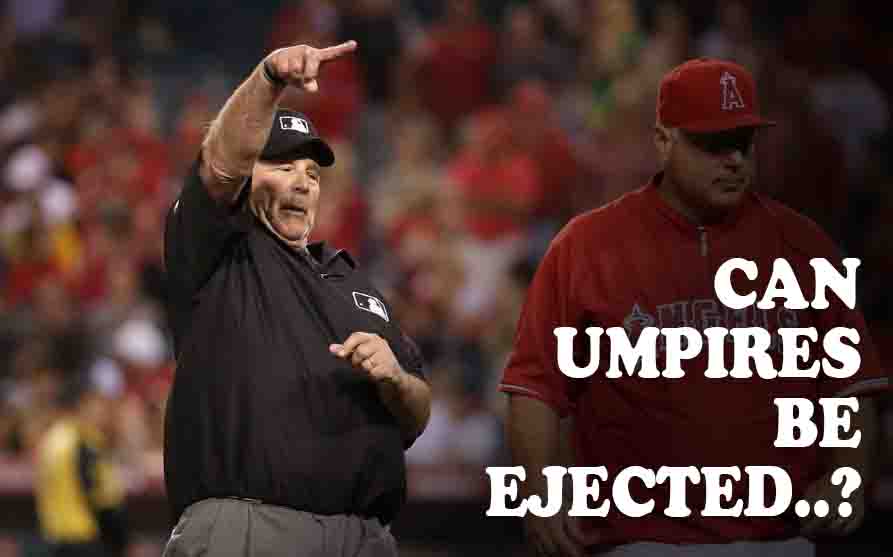There’s a reason why baseball has become a popular spectator sport, and it’s not just because it’s so much fun to watch. Baseball is a game that requires a certain level of skill, and if you want to play at a high level, you need to have a good umpire. Umpires make or break a game, and they can either help you win or help you lose.
In this post, we discuss whether an umpire can be ejected from a game, and what happens if they are.
Table of Contents
Can One MLB Umpire Eject Another Umpire?
An umpire can’t eject another umpire during a game, no matter what. You’re not going to see an umpire getting an ejection for missing a call during a game In professional sports, umps are subject to penalties if they repeatedly fail to make calls during a game. The fines are set up to punish the umpire and hopefully correct the error.

Can Umpires Leave a Baseball Game?
When a baseball game ends, umpires must determine which team wins. When determining the winner, umpires must consider several factors, including the final score of the game, whether the winning team had an extra inning, and whether a player on the losing team committed a major or minor infraction.
Once the umpire decides which team wins, they must leave the field, leaving both teams to celebrate.
Umpires must remain on the field until the winning team has won the game by the number of runs necessary for a safe victory. If there are ties or if the teams are tied after nine innings, the game goes into extra innings.
The number of runs needed to win the game is determined by the number of balls and strikes called during the game. The final out of the game is called the last out of the series, and the final batter of the game is known as the last batter of the game.
If a batter walks during the game, the batter is out, and the runner scores the run. Once a player is out, the game is over and the team loses. If a batter hits a home run in the game, the batter becomes the new last batter.
What are Reasons to Eject Players During a Game?
A game ejection is when a coach or referee decides that the player has performed poorly or acted in a dangerous manner and he or she should be removed from the field or the game.
In general, coaches are expected to be able to control the action on the field, but there are times when they need to step in and remove a player for the safety of the players or themselves.
The following are some of the reasons that a player might be ejected from a game:
– Disruption of play: This happens when a player, without provocation, makes physical contact with a member of the opposing team, commits any illegal act, or disrupts the flow of the game.
– Dangerous play: This includes reckless, careless, or unsafe behavior that could harm a member of the opposing team. It can include taunting or rough tackling.
– Offensive or abusive language: This includes obscene gestures, racial slurs, and shouting at another player.
What Happens if You Hit an Umpire?
If you hit an umpire, it’s called a balk.
A balk occurs when a pitcher attempts to intentionally throw a ball at a batter that goes past the catcher and strikes him. That is a violation of baseball rules, and the umpire should issue a warning. It is usually called a balk for one or more reasons.
1) The catcher makes no attempt to throw to the base or to prevent the pitch from going by.
2) The pitcher throws the ball too far off his target or at an angle that forces the catcher to make an unnecessary effort to throw it.
3) The pitcher throws a pitch out of the strike zone.
4) The batter hits a thrown pitch.
5) The batter tries to interfere with the catcher’s ability to catch a pitched ball.
6) The batter hits a pitch after the ball is delivered.
How Many Umpires Call an MLB Game?
Major League Baseball (MLB) umpires call about 1.4 million games per year. That number includes 2,000 games every weekend, including Thursday and Friday games, as well as interleague matchups.
Umpires are responsible for calling balls and strikes, determining the ball and strike counts, determining the fielders’ positions, and keeping score. They also make calls on whether the batter should be allowed to swing after the pitcher throws the ball.
As for the number of calls that are made in any given game, it depends on the length of the game. Games in the National League generally take about five hours, while the American League games tend to take six hours.
While the majority of umpires are male, a smaller percentage are female, including the president of the Women’s Umpiring Association. The WUA is an organization that is dedicated to advancing the umpiring profession through education and recognition of outstanding women umpires.
According to the WUA, there are about 100 full-time umpires working in the MLB alone. However, those numbers include umpires who are part-time or freelance, which can vary seasonally.
Best Calling Positions for MLB Games
There are various roles that umpires play during a baseball game, from announcing scores to tracking pitches.
When the batter steps up to the plate, the umpire has the responsibility of determining whether or not the batter is out. This is called the first base umpire. While the first base umpire is watching the batter, the other umpire is responsible for tracking the pitcher’s pitch.
When a pitch is thrown, the umpire who tracks the pitch is called the second base umpire. This is the umpire who is closest to the plate, meaning that he or she has the best view of the batter’s box.
Umpires are also responsible for calling a runner safe or out, as well as deciding whether a batter is out when his or her bat breaks.
The third base umpire is usually the person who determines whether a batter is safe or out on the bases. In this position, the third base umpire is the furthest away from the plate.
The two remaining umpires are responsible for calls at home plate and in the field. Home plate umpires determine whether or not a pitch is fair or foul. They also decide whether or not the batter is out when his or her bat breaks.
Field umpires are responsible for making decisions on plays that occur outside the field. They are usually the closest to the action, which means they are able to quickly make calls to runners and determine whether or not the ball was fair or foul.
Can an Umpire Reverse an Ejection?
In baseball there is no reversal of a player’s ejection or coach in a baseball game by the umpire crew members. Umpires do make errors in judgment. If you get ejected, it is highly unlikely that the umpire will reverse the decision. Most field umpires will admit a mistake, but if a player or coach continues unsportsmanlike conduct after an ejection, the original ruling won’t get overturned.
Conclusion
In Conclusion, If you have to ask how baseball umpires handle player confrontations, you’re doing something wrong. Most baseball players will tell the umpire if he calls a strike on them, but they usually aren’t ejected. Standing the umpire at the plate to make them look bad is not a good idea. You can expect a removal.
